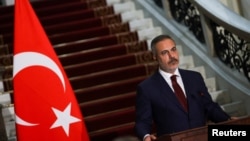Ethiopian and Somali officials are holding indirect talks in Ankara, Turkey as the two sides attempt to end the diplomatic dispute over Ethiopia's deal with the breakaway region of Somaliland that has been simmering between the two countries since the beginning of this year.
Diplomatic sources told the VOA Horn of Africa Service that delegations from the two countries have not had face-to-face meetings. Instead, Turkey has been playing the intermediary role between the two countries.
Turkish Foreign Affairs Minister Hakan Fidan separately met his counterparts from Somalia, Ahmed Moallim Fiqi, and Ethiopia’s Taye Atske Selassie.
According to an official close to the talks, who asked not to be identified because of the sensitivity surrounding them, Fidan met twice with each side Monday to narrow their differences.
Key issues under deliberation are thought to include the fate of the controversial memorandum of understanding, or MOU, that Ethiopia signed with Somaliland on January 1, and Ethiopia’s quest for sea access.
As part of the deal, Somaliland would lease 20 kilometers (12 miles) of land along its coastline to Ethiopia to establish a marine force base. In return, Ethiopia would recognize Somaliland’s independence.
Somalia denounced the MOU with the breakaway region as infringing upon its sovereignty and territorial integrity.
The official who spoke to the VOA Horn of Africa Service confirmed that the sticking points are the “language to withdraw the MOU and language of modalities to access the sea.”
Ahead of the talks, Turkey’s President Recep Tayyip Erdogan spoke to the leaders of Somalia, Hassan Sheikh Mohamud, and Ethiopia, Abiy Ahmed, to urge reconciliation.
In his conversation with President Mohamud, Erdogan posted on X, formally Twitter, that he voiced his expectations of “concrete results in the second round of the negotiations.”
And in his phone call with Prime Minister Ahmed, Erdogan hinted on X that he urged Ethiopia to take steps that would eliminate Somalia’s concerns regarding its unity, sovereignty and territorial integrity.
Ahmed wrote on X about the importance of providing Ethiopia access to the sea in a “mutually agreeable approach.”
Meanwhile, Mohamud said on X that Somalia is ready to "engage in economic and development cooperation with Ethiopia” but insisted, “such partnerships must always respect Somalia's sovereignty, unity, and territorial integrity, and adhere to international law and norms.”




